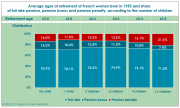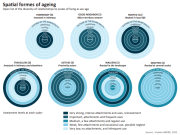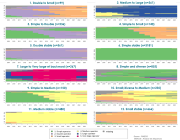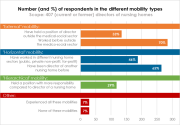
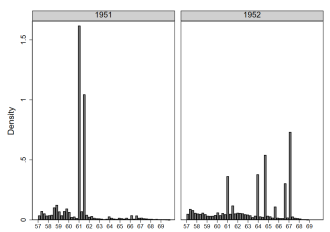
Répartition de l'âge de départ des femmes retraitées ayant cotisé 35 ans, concernées ou non par la réforme (nées en 1952 et en 1951)
Source : Données administratives de l'INPS, échantillon de femmes retraitées nées en 1951 ou 1952 (observations entre 2008 et 2020).
Elena BASSOLI, economist, studied retirement behaviour by analysing the impact of a major Italian reform (Monti-Fornero, 2012): while maintaining the minimum number of years of contributions at 20, the minimum age for receiving a full pension was raised from 60 to 64, starting with the 1952 generation. Together with Ylenia BRILLI, Elena BASSOLI analysed the impact of this reform on women, who are more exposed to financial difficulties in retirement.
The quantification of the effect of the reform is based on the early retirement scheme offered to Italian women: a minimum retirement age of 57, after 35 years of contributions, with a specific pension calculation. The reform did not change this age, but at the cost of reducing the full pension by up to 30%. Has this penalty encouraged women to work until the age of 64? The study answers this question by means of a difference in discontinuities analysis, which compares the retirement age of women with 35 years of contributions according to whether they were born in 1951 or 1952. The database of retired women shows that, between 2011 and 2020, retirement was massively concentrated between the ages of 61 and 62 for the 1951 cohort, while the distribution was very spread out for the 1952 cohort. However, 47.22% of the latter retired before the age of 64 and the average retirement age has dropped from 61 years and 7 months to 60 years and 11 months. The reform has led many women to opt for early retirement, at the cost of a financial penalty estimated at 15% of their pension compared with the generation not affected.
Gradual reforms would probably have prevented so much use of this penalising exit option.
Post-doctorante Paris School of Economics
Références :
- Bassoli E, Brilli Y, (2024) “Working longer or opting out? Women’s costly response to a recent pension reform”, working paper
- Bassoli E., Bonsang E., Brugiavini A., Pasini G., (2022) ``End-of-Life Care and Depression'' Applied Economics Letters DOI: hIps://doi.org/10.1080/13504851.2022.2099516
- Bassoli E., Belloni M., Brugiavini A., Gao Y., ``Did the pandemic change retirement trends?" (2023) In ``Social, health, and economic impacts of the COVID-19 pandemic and the epidemiological control measures", De Gruyter
